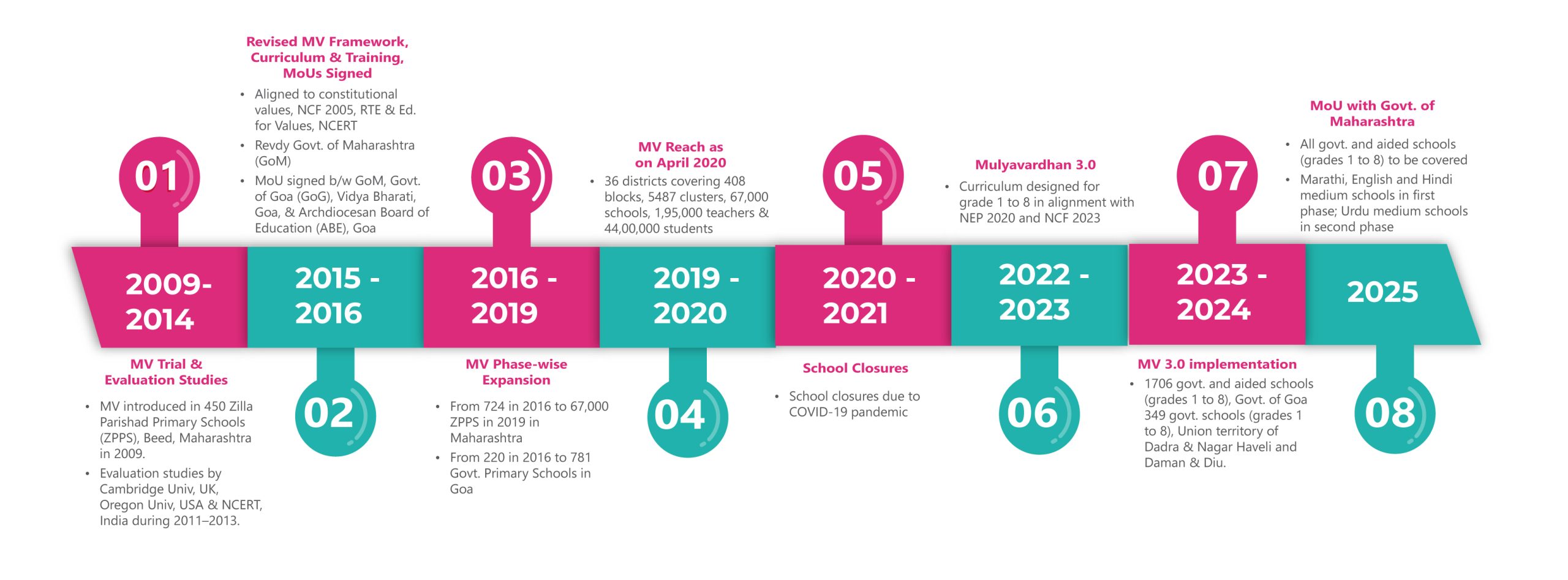Mulyavardhan began as a heartfelt mission by the Shantilal Muttha Foundation to nurture value-based citizenship in India’s youngest learners. What started in 2009 as Mulyavardhan 1.0, a pilot deeply grounded in research and global best practices, evolved into Mulyavardhan 2.0, a government-adopted movement reaching over 45 lakh children across Maharashtra, Goa, and Gujarat. With its joyful, child-centric pedagogy and deep integration of constitutional and human values, it became a beacon of values education; embraced by teachers, schools, and communities alike.
MV PROJECT - MAHARASHTRA
Maharashtra’s Leap Towards Value-Based Education: The Mulyavardhan Revolution
Rooted in Vision, Evolved Through Experience
A New Chapter for a New Era
Now, with Mulyavardhan 3.0, we are reimagining values education for today’s dynamic learning environments. Designed as a flexible, inclusive platform aligned with the NEP 2020, the current version of Mulyavardhan empowers schools to offer holistic, engaging experiences that promote self-expression, empathy, and critical thinking. Whether in a rural government school or an elite urban classroom, Mulyavardhan champions the cause of raising thoughtful, responsible, and compassionate citizens.
Evolution of Mulyavardhan
1. 2002–2009: Conceptual Foundation
India, a land deeply rooted in culture and values, has witnessed rapid changes impacting family dynamics and social norms. Recognising the urgency for a positive, long-term and foundational response, Shantilal Muttha Foundation made an extensive study of the school education system and its curriculum and pedagogy.
Though values are always present in the curriculum, SMF undertook a deeper inquiry into how they were actually being taught and absorbed. This period laid the crucial philosophical and theoretical foundation for what would later become the Mulyavardhan programme.
2. Mulyavardhan 1.0 (2009–2015): Pilot phase, Cambridge & NCERT studies conducted.
- Activities designed on principles of cooperative learning
- Direct implementation in ~450 govt. primary schools across two tehsils of Beed district, Maharashtra
- Impact assessed by experts from Cambridge University and NCERT
3. Mulyavardhan 2.0 (2015–2020):
- Conceptual framework designed in alignment with Constitutional values, National Curriculum Framework (NCF) 2005 and globally recognised CASEL framework for social and emotional learning
- Framework and educational materials reviewed and approved by Maharashtra State Council of Educational Research and Training (SCERT)
- Programme adopted by Govt. of Maharashtra and Govt. of Goa; also, Porbandar district, Gujarat
- Offered in 6 languages (Marathi, Urdu, English, Hindi, Konkani, Gujarati).
- Scaled across 68,000+ govt. primary schools.
- Reached 45 lakh students and 2 lakh teachers.
Adopted by aided and private school networks.
4. Mulyavardhan 3.0 (2022 onwards):
- Aligned with NEP 2020; NCF 2023; social, emotional and ethical development (SEED) competencies; and curricular goals of language, social sciences, physical and mental well-being.
- Flexible, tech-enabled platform, adaptable across diverse school types – government, private, urban, rural.
A powerful collaboration between the Government of Maharashtra and Shantilal Muttha Foundation is reshaping the future of education, by placing values at the heart of learning.
Mulyavardhan 3.0 a value-based education programme rooted in constitutional values, is being embraced across Maharashtra. It is more than an initiative, it is a movement to empower students with empathy, integrity, and responsible citizenship; transform classroom practices; and catalyse deep changes in the school education ecosystem.
Key Milestones of Mulyavardhan in Maharashtra (2025)
- 28 April 2025: A historic MoU was signed between the Government of Maharashtra and Shantilal Muttha Foundation in the presence of the Hon’ble Chief Minister Shri Devendra Fadnavis.
- 29 May 2025: Mulyavardhan materials were reviewed and approved by expert groups appointed by SCERT, Pune.
- 13 June 2025: Print-ready materials were handed over to SCERT for state-wide distribution.
- 16 June 2025: State Resource Group (SRG) training, jointly organised by SCERT and SMF, commenced for creating a cadre of Mulyavardhan master trainers.
- 16 July 2025: Hon’ble CM invited IIT Mumbai to conduct a third-party longitudinal impact study.
- 18 July 2025: SRG training successfully concluded.
- 21 July 2025: First District Resource Group (DRG) training commenced, marking statewide rollout.
Together, we are sowing the seeds of a more empathetic, equitable, and enlightened Maharashtra.
Mulyavardhan Journey in Maharashtra

